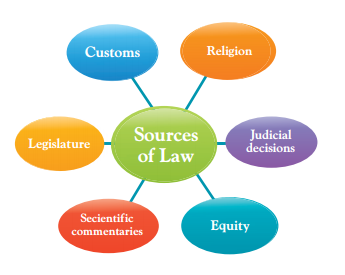Chapter: 11th Political Science : Chapter 4 : Basic Concepts of Political Science Part II
Do you want to know the sources of Law?
Do you want to know the sources of Law?

i. Customs
Customs play an important role in the framing of the laws. Most of the laws that came from customs are recognized by state later. Since ancient period we can notice that the dispute among tribals were resolved by the head of the Tribes using their customs and traditions. Customs became laws when tribes extended into the formation of state. State cannot actually ignore the customs of the country. The common law of England for example sprang mainly from customs.
For example Bull-Taming sport culture of Tamils of
India resulted into the creation of Jallikattu Law in 2017. (Read the box for
more information about Jallikattu Law of 2017)
ii. Religion
The religion practiced by Primitive communities
played a decisive role in evolving the laws of the state later. Religion was a
basis of law for most of the nation. The origin of Hindu law can be traced in
the code of Manu. The origin of Mohammedian law can be traced in Shariat law.
Divine law is a law revealed through man from God. God is the ultimate source
of divine law. For Christians Ten Commandments were the first law given by the
Lord Almighty to his people and was considered as the basis of law.
“Indeed the early law of Rome was little more than
a body of technical religious rules, a system of means for obtaining religious
rights through the proper carrying out of certain religious formulas”. -Woodrow Wilson
iii. Judicial decisions
Gettell maintains
that the ‘state arose not as the
creator of law but as the interpreter and enforcer of custom’. The function of
the Judiciary is to interpret and declare the law. While discharging its
function the judiciary creates new laws. The laws later gets recognized by the
state. Judicial decisions thus became an another source of law. Some time the
verdict of High Court and Supreme Court are treated as laws.
iv. Equity
When laws are ambiguous and do not fit in, the
principles of equity are applied and cases are decided according to commonsense
and fairness.
“Equity is a body of rules existing by the side of
the original civil law, founded on distinct principles and claiming
incidentally to supersede the civil law in virtue of a superior sanctity
inherent in those principles.” - Sir Henry
Maine
Equity
v The name
given “Equity” is the set of legal principles in countries following the
English common law tradition, which supplement strict rules of law where their
application would operate harshly, so as to achieve what is sometimes referred
to as “natural justice”
v It also
means “fairness”
v Equity
has been described as “a gloss (meaning a supplement) on the common law, filling
in the graps and making the English legal system more complete
v In
English Law, equity means that body of rules originally enforced only by the
court of chancery.
v. Scientific
commentaries
Another source of law are scientific commentaries.
when the commentary appears it is understood only as an argument, later on its
authority is recognized as more authoritative than the Judicial decision.
“The opinion of learned writers on law have often
been accepted as correct law: in England , for instance the opinions of Coke
and Blackstone in America of story and kent , in India of Vijnaneswara and
Apararka” - A.
Appadurai
vi. Legislature
Most of the laws in the modern times are framed by
legislature and it is one of the most important source of law. Indian constitution
is a classical example where the best provisions of other constitutions are
borrowed and made it available for the best of our nation
“The state is founded on the minds of its citizens,
who are moral agents.. a bad people means a bad state and a bad laws.” - Gilchrist
Sources Of The Indian Constitution
Government of India Act 1935: The federal scheme. Office of the Governor. Role of federal
judiciary. Emergency provisions
UK Constitution: Law making
procedures, Parliamentary Government, Rule of Law, Single citizenship and
Bicameral Legislature.
US Constitution*: Fundamental Rights, Independent judiciary, Judicial Review, Impeachment of the
President, Procedure for the removal of the judges of the Supreme Court, High
Courts and Role of Vice President.
Related Topics